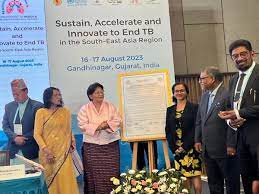
The Gandhinagar Declaration was adopted at the end of the two-day meeting held to follow up on the progress made to end TB, a flagship priority in the Region, and in the run up to the UN High Level Meeting (UNHLM) on TB on 22 September in New York.
The Declaration calls for establishing high-level multisectoral commission reporting to the highest political level in each country for synergy of efforts among various stakeholders, and to monitor progress towards ending TB and other priority diseases.
“This high-level multisectoral commission on TB could also help build responsive health systems and advance universal health coverage and health security,” the Regional Director said adding that during the COVID-19 pandemic, TB infrastructure was rapidly deployed for infection diagnosis and containment.
The declaration calls for ensuring appropriate adoption and use of science and technology for equitable and human rights-based TB services that are accessible to all irrespective of any social, cultural, or demographic divide through an integrated, primary health care approach.
It emphasises on allocation of necessary resources to meet TB service coverage targets and address social determinants to have multi-disease impact.
 “In 2022, TB allocations in the Region reached US$ 1.4 billion, of which 60% was from domestic sources. However, for mission success, we need at least US$ 3 billion annually, which will also help maintain key social protection programmes, such as for nutritional support. Let us build on the substantial increases already achieved,” Dr Khetrapal Singh said.
“In 2022, TB allocations in the Region reached US$ 1.4 billion, of which 60% was from domestic sources. However, for mission success, we need at least US$ 3 billion annually, which will also help maintain key social protection programmes, such as for nutritional support. Let us build on the substantial increases already achieved,” Dr Khetrapal Singh said.
The Regional Director also emphasised on empowering and engaging TB-affected communities, by not just listening to, but truly hearing them.
The declaration calls on WHO to maintain TB as a Flagship Priority Programme over the coming years and provide leadership and technical support to countries for sustained and accelerated approaches supported by research and innovation.
It calls upon all partners to enhance their support to end TB and priority diseases in the Region as per the UN Sustainable Development Goals target 3.3 – End the epidemics of AIDS, tuberculosis, malaria and neglected tropical diseases and combat hepatitis, water-borne diseases, and other communicable diseases.
Home to a quarter of the global population, the WHO South-East Asia Region accounts for nearly half of the new TB cases and deaths globally every year.
For more information on TB in the Region – https://www.who.int/southeastasia/health-topics/tuberculosis











